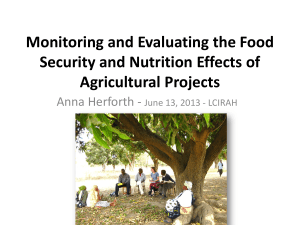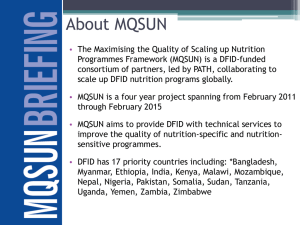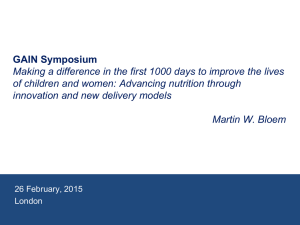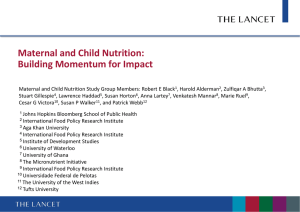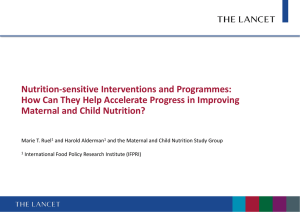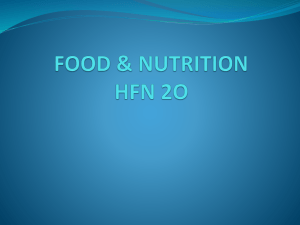Nutrition Survey, Kampot, Kambodia Mai 1996
advertisement
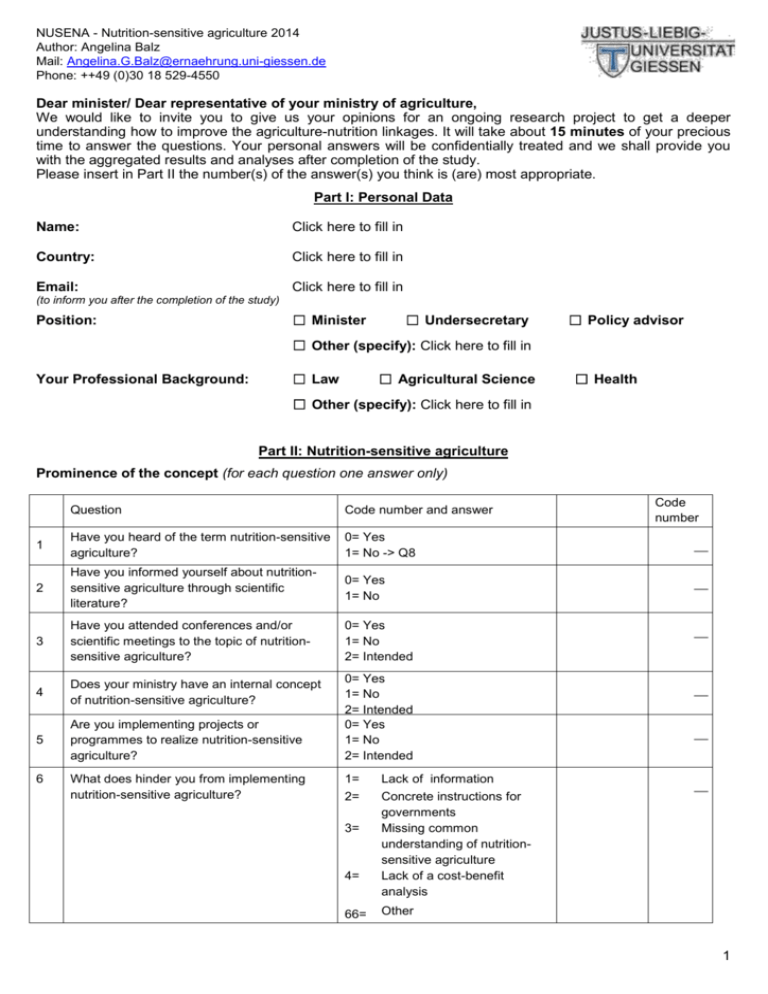
NUSENA - Nutrition-sensitive agriculture 2014 Author: Angelina Balz Mail: Angelina.G.Balz@ernaehrung.uni-giessen.de Phone: ++49 (0)30 18 529-4550 Dear minister/ Dear representative of your ministry of agriculture, We would like to invite you to give us your opinions for an ongoing research project to get a deeper understanding how to improve the agriculture-nutrition linkages. It will take about 15 minutes of your precious time to answer the questions. Your personal answers will be confidentially treated and we shall provide you with the aggregated results and analyses after completion of the study. Please insert in Part II the number(s) of the answer(s) you think is (are) most appropriate. Part I: Personal Data Name: Click here to fill in Country: Click here to fill in Email: Click here to fill in (to inform you after the completion of the study) Position: ☐ Minister ☐ Undersecretary ☐ Policy advisor ☐ Other (specify): Click here to fill in Your Professional Background: ☐ Law ☐ Agricultural Science ☐ Health ☐ Other (specify): Click here to fill in Part II: Nutrition-sensitive agriculture Prominence of the concept (for each question one answer only) Code number Question Code number and answer 1 Have you heard of the term nutrition-sensitive agriculture? 0= Yes 1= No -> Q8 _ 2 Have you informed yourself about nutritionsensitive agriculture through scientific literature? 0= Yes 1= No _ 3 Have you attended conferences and/or scientific meetings to the topic of nutritionsensitive agriculture? 0= Yes 1= No 2= Intended _ 4 Does your ministry have an internal concept of nutrition-sensitive agriculture? _ 5 Are you implementing projects or programmes to realize nutrition-sensitive agriculture? 0= Yes 1= No 2= Intended 0= Yes 1= No 2= Intended 1= Lack of information 2= Concrete instructions for governments Missing common understanding of nutritionsensitive agriculture Lack of a cost-benefit analysis _ 6 What does hinder you from implementing nutrition-sensitive agriculture? 3= 4= 66= _ Other 1 NUSENA - Nutrition-sensitive agriculture 2014 Author: Angelina Balz Mail: Angelina.G.Balz@ernaehrung.uni-giessen.de Phone: ++49 (0)30 18 529-4550 The concept of nutrition-sensitive agriculture 7 Do you consider the idea of nutritionsensitive agriculture basically useful? 8 Which definition of nutrition-sensitive agriculture do you consider most appropriate? (one answer only) 9 1= 2= 3= 4= yes yes under certain conditions no, the concept is not new no, the concept is wrong 1= Nutrition-sensitive agriculture explicitly incorporates nutrition objectives and indicators into agriculture and addresses the utilization dimension of food and nutrition security, including health, education, economic, environmental and social aspects. 2= Nutrition-sensitive agriculture means to diversify the production and consumption of foods. 3= Nutrition-sensitive agriculture involves the design and adoption of cropping and farming systems which can provide agricultural remedies to the prevailing nutritional maladies. 4= Nutrition-sensitive agriculture ensures the year round availability and accessibility of a variety of diverse foods and prevents nutrient losses, so that when consumed these foods improve nutrient intake through dietary diversification, improve levels of nutrition, and prevent macro- and micronutrient deficiencies. Which factors should be considered while implementing nutrition-sensitive agriculture? (multiple answers possible) _ _ Please mark Gender Equity Education Forests Land tenure Environment Culture Health hazards Value Chain Policy coherence Collaboration of professionals in agriculture, nutrition and health Other (specify): Click here to fill in ☐ ☐ ☐ ☐ ☐ ☐ ☐ ☐ ☐ ☐ ☐ In the next section the questions refer to the terms food security and nutrition security. Food security according to the FAO exists when all people, at all times, have physical, social and economic access to sufficient safe and nutritious food that meets their dietary needs and food preferences for an active and healthy life. Nutrition security has a wider scope and includes linkages between food intake, care and health. 2 NUSENA - Nutrition-sensitive agriculture 2014 Author: Angelina Balz Mail: Angelina.G.Balz@ernaehrung.uni-giessen.de Phone: ++49 (0)30 18 529-4550 10 Which elements do you think should be included in the concept of nutrition sensitive agriculture for nutrition security? (multiple answers possible) Please mark Health Nutrition Education Care Gender Equity Food Security Sustainable agriculture Policy coherence Collaboration of professionals in agriculture, nutrition and health Other (specify): Click here to fill in 11 Which elements do you think should be included in the concept of nutrition sensitive agriculture for food security? (multiple answers possible) Diversification Soil fertility Agricultural tools (biofortification, micronutrient-enriched fertilizers) Increased Production Income Generation Nutrient bioavailability Reduce post-harvest losses Marketing of nutrient-dense foods Other (specify): Click here to fill in Which elements do you think should be included in the concept of nutrition sensitive agriculture to consider care? (multiple answers possible) ☐ Please mark Specialization in single nutrient-rich crops 12 ☐ ☐ ☐ ☐ ☐ ☐ ☐ ☐ ☐ ☐ ☐ ☐ ☐ ☐ ☐ ☐ ☐ ☐ Please mark Impact on women´s time burden Impact on men´s time burden Empowerment of women Impact on women´s income Impact on men´s income Other (specify): Click here to fill in ☐ ☐ ☐ ☐ ☐ ☐ 3 NUSENA - Nutrition-sensitive agriculture 2014 Author: Angelina Balz Mail: Angelina.G.Balz@ernaehrung.uni-giessen.de Phone: ++49 (0)30 18 529-4550 13 Which elements do you think should be included in the concept of nutrition sensitive agriculture to consider health? (multiple answers possible) Please mark Water pollution Health hazards through use of chemicals Vector-borne diseases (e.g. malaria) Food-associated disease (e.g. diarrhea) Zoonotic diseases Management of natural resources Other (specify): Click here to fill in 14 Which foods should be in the focus of nutrition-sensitive agriculture? (two answers possible) 1= primary focus 2= secondary focus Foods of locally adapted varieties Genetically modified foods Biofortified foods Legumes Animal foods Cash crops Small scale animal foods Culturally accepted foods Fruits and vegetables Nutrient-dense staple foods Wild/collected foods Other (specify): 15 Which production system is most appropriate for nutrition-sensitive agriculture? ☐ ☐ ☐ ☐ ☐ ☐ ☐ 1= Small-scale production 2= Organic farming 3= Specialized farms 4= Conventional farming 5= A combination of different production methods 6= No specified production system 66= Other (specify): Click here to fill in _ _ _ _ _ _ _ _ _ _ _ _ _ 4 NUSENA - Nutrition-sensitive agriculture 2014 Author: Angelina Balz Mail: Angelina.G.Balz@ernaehrung.uni-giessen.de Phone: ++49 (0)30 18 529-4550 Added value of the concept (for each question one answer only) 16 17 What is in your opinion the aim of nutrition-sensitive agriculture? 1= Nutrition-sensitive agriculture aims to maximize the impact of the food and agricultural sector on nutrition outcomes, while minimizing the unintended negative nutritional consequences of agricultural interventions and policies along the value chain from farmers to consumers. 2= Nutrition-sensitive agriculture aims to link agriculture, nutrition and health. 3= Nutrition-sensitive agriculture aims to combat undernutrition and micronutrients deficiencies. 4= Nutrition-sensitive agriculture aims to narrow the gap between available and accessible food and the food needed for a healthy and balanced diet for all people. 5= Nutrition-sensitive agriculture aims to combat all forms of malnutrition (underand overnutrition as well as micronutrients deficiencies). 6= Nutrition-sensitive agriculture aims to foster sustainable diets. “The concept of nutrition-sensitive agriculture is necessary to secure nutrition for all people!” 1= 2= 3= 4= 5= 6= I totally agree I strongly agree I agree I disagree I strongly disagree I totally disagree _ _ The next question refers to the right to food approach. The right to adequate food is realized when every man, woman and child, alone or in community with others, has physical and economic access at all times to adequate food or means for its procurement. (http://www.fao.org/righttofood/en/) 18 Nutrition-sensitive agriculture and the right to food are… 1= 2= 3= 4= 5= Contrary approaches Complementary approaches Independent approaches The same approach I do not know _ Thank you for your time and cooperation! Contact address for further information: Angelina Balz, BSc Federal Ministry of Food and Agriculture, Division 622 - World Food Affairs, Int. Food and Agricultural Organizations Wilhelmstrasse 54 D-10117 Berlin, Germany Tel.: ++49 (0)30 18 529-4550 Prof. Michael B. Krawinkel, MD Institute of Nutritional Sciences International Nutrition Justus-Liebig-University Wilhelmstrasse 20 D-35392 Gießen, Germany Tel: ++49 (0)641 9939048 5
